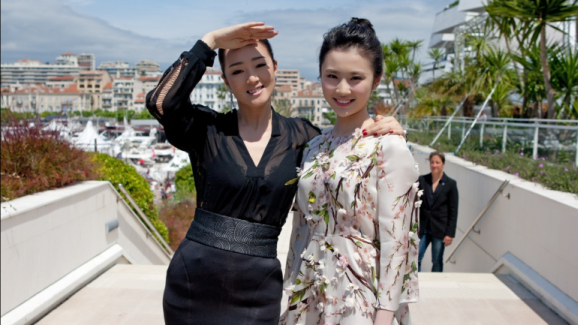In the late ’80s and early ’90s, director Zhang Yimou and actress Li Gong brought “serious” Chinese cinema to the forefront of international awareness with such films as Ju Dou and Raise The Red Lantern. I think this was taken by some as a sort of rebuttal to the chop-socky action flicks that came out Hong Kong and essentially defined Chinese film as the world had known it throughout the ’70s and ’80s. This is one reason why the later Zhang Yimou films with Zhang Ziyi (no relation) like Hero and House of Flying Daggers are so delightful: They embrace the martial arts mythos of studios like the Shaw Brothers and Golden Harvest.
The Western equivalent is almost like the distinction between the Batman serials of the ’40s and the campy TV show, and Christopher Nolan’s “Dark Knight” trilogy, except that there was often truly great (if highly stylized) art in those chop-socky films.
But Zhang and Li are together again, nearly 25 years after Lantern with a serious story and one that, surprisingly, reflects rather poorly on the Cultural Revolution so beloved at the time by intellectuals. I guess the Party decided that the Revolution was bad after Mao’s death, so it’s okay to trash—but don’t expect any reflection on the creation and authorization of social and government structures that make things like mass imprisonment and slaughter possible. (It’s never the power that’s the problem, only that the right people have it, amirite?)
The story is this: Lu (Chen Daoming of Hero) has been imprisoned in a reeducation camp for a really long time (we’re not given a precise timeline, and his imprisonment seems to have been only part of his punishment) when he suddenly escapes. Various representatives of the Party scrutinize his wife, Feng (Li), letting her know to contact or aid him in any way would mean dire things. Meanwhile, their daughter Dan Dan (newcomer Zhang Huiwen, no relation,) is up for a big role in a Communist ballet.

Springtime for Mao.
Dan Dan is angry at her father, whom she does not remember, so long has he been gone, and whom she only knows as an Enemy of the State, because his antics jeopardize her shot at the lead in this (truly horrifying looking) ballet. But Feng is so passionately in love with Lu, even after so many years apart, she prepares to meet him, to bring him food and to help him evade capture. Dan Dan is lured into betraying her parents on the promise of getting that lead role, and in the ensuing scuffle, not only is Lu recaptured, but Feng is injured trying to reach him. (And Dan Dan doesn’t get the part. Rotten commies.)
This is all prologue to the main act, which is Lu’s subsequent return from imprisonment four years later—the “coming home” of the title. Because when he returns home, he discovers his beloved Feng has a sort of amnesia and doesn’t even recognize him.
Heartbreaking.
The movie is really about Lu’s struggle to reunite his family.
The performances are tremendous, as you might expect. The camera work is—well, it’s subdued if you’re coming from the opulent Hero and House of Flying Daggers—but it is subtly effective. The music is marvellous with a traditional (Western) score.

Then they discover a box of verbose fortune cookies.
Not to tell tales out of school, but The Boy, typically stone-faced, was sniffling a bit at the end of this one. That gives you a sense of how effective it is as a drama.
Usually, when we see a film, we know right away whether or not it is going to make our list of great movies. (Sometimes movies kind of grow on you or sneak up on you.) And while we have seen many fine films this year, the list of truly great ones has been very short. The Boy’s list, for example, includes American Sniper, Mommy, I think Wild Tales is on there. You might note that these are all 2014 movies, but he says “I saw them in 2015, so that’s the list they go on.”
His list of best films actually from this year is very short: Fury Road, Meet The Patels, 5 to 7, and now Coming Home. I can’t disagree. It’s a shame it only got a highly limited release: We barely managed to see it before it closed.
This will definitely claim some Oscar nominations.

But they’ll look like this, not the impoverished Chinese peasants of the movie.
